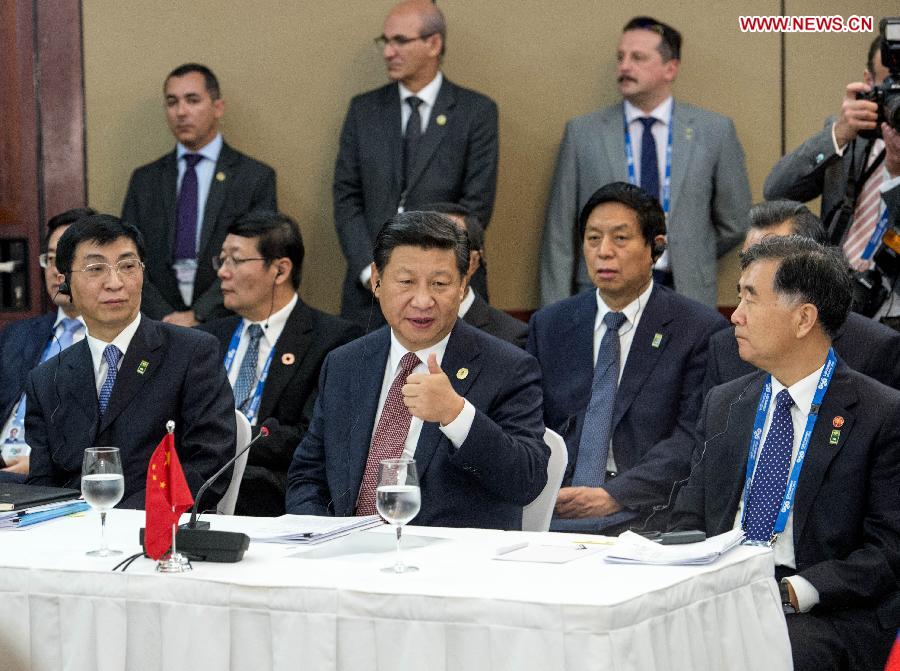For a fair and just international system
- By Zhao Jinglun
 0 Comment(s)
0 Comment(s) Print
Print E-mail China.org.cn, November 17, 2014
E-mail China.org.cn, November 17, 2014
As China's influence rises rapidly on the world stage, some Western analysts worry that China will launch its own multinational institutions. Writing in a recent article, Steven Mufson, who covered China for the Washington Post for four years during the 1990s, claims that the United States is wary of China playing a bigger role in setting international rules. Like several other commentators, he cited the Beijing-based Asian Infrastructure Investment Bank (AIIB), to which China would give US$50 billion to launch. But the bank is meant to supplement with and not replace the World Bank and the Manila-based Asian Development Bank.
|
|
|
Chinese President Xi Jinping (C front) attends a meeting of leaders of the BRICS countries in Brisbane, Australia, Nov. 15, 2014. [Xinhua/Li Xueren] |
Chinese President Xi Jinping, in his speech at the G-20 summit in Brisbane, did urge G-20 members to improve global economic governance, and strive for a fair, just, inclusive and orderly international financial system. He suggested that efforts should also be made to increase the presence of developing countries and emerging-market economies, and offer them a bigger say in international systems. He stressed that efforts should be made to ensure the equality of all countries in global economic cooperation in terms of rights, opportunities and rules.
One obvious outstanding case is the voting share at the International Monetary Fund (IMF). China has only a 3.81 percent voting share, which is smaller than France's share, even though the French economy is less than one-third the size of China's. It is long overdue to correct this unreasonable situation. The U.S. president and his European allies have done nothing to change the IMF voting rights. Republican control of both houses could pose even bigger obstacles to such changes.
But the current of history is unstoppable. The United States has been drumming up support for its regional trade group the Trans-Pacific Partnership (TPP), which so far excludes China. As an important part of U.S. strategy to rebalance to Asia-Pacific, it is viewed as a challenge to China's rise. But contentious issues have prevented the negotiations from being concluded in 2012.
In contrast, China has successfully pushed for the Free Trade Area of the Asia-Pacific which includes the United States at the recent informal APEC summit in Beijing.
China has consistently championed openness, inclusiveness, transparency and non-discrimination, which President Xi expounded eloquently at G-20 summit in Brisbane.
In his speech, Xi did mention the fact that this year marks the 70th anniversary of the Brettan Woods Conference, and people are summing up the experience of the Brettan Woods system. He suggested to make that system fairer and more just, not to overturn that system. As Carolyn Atkinson, the White House deputy national security advisor for international economics, observed: "I think the world is looking increasingly to China to abide by the international rules of the road that have supported its growth over the past 25 years."
The world is changing fast, and people need to keep up with it, preserving what works, keep improving the world system, and making it fairer and more just.
The writer is a columnist with China.org.cn. For more information please visit: http://www.china.org.cn/opinion/zhaojinglun.htm
Opinion articles reflect the views of their authors, not necessarily those of China.org.cn.







Go to Forum >>0 Comment(s)